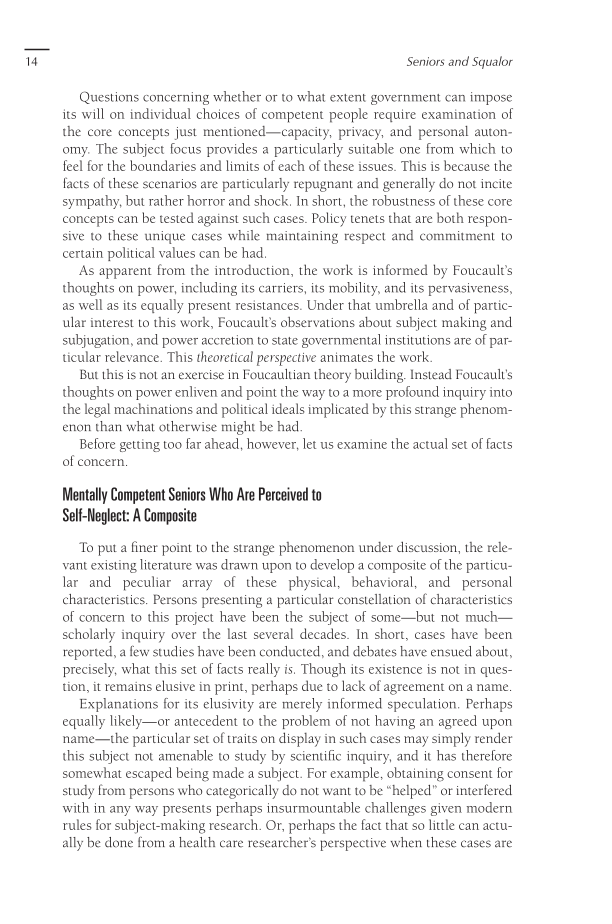14 Seniors and Squalor Questions concerning whether or to what extent government can impose its will on individual choices of competent people require examination of the core concepts just mentioned—capacity, privacy, and personal auton- omy. The subject focus provides a particularly suitable one from which to feel for the boundaries and limits of each of these issues. This is because the facts of these scenarios are particularly repugnant and generally do not incite sympathy, but rather horror and shock. In short, the robustness of these core concepts can be tested against such cases. Policy tenets that are both respon- sive to these unique cases while maintaining respect and commitment to certain political values can be had. As apparent from the introduction, the work is informed by Foucault’s thoughts on power, including its carriers, its mobility, and its pervasiveness, as well as its equally present resistances. Under that umbrella and of partic ular interest to this work, Foucault’s observations about subject making and subjugation, and power accretion to state governmental institutions are of par ticular relevance. This theoretical perspective animates the work. But this is not an exercise in Foucaultian theory building. Instead Foucault’s thoughts on power enliven and point the way to a more profound inquiry into the legal machinations and political ideals implicated by this strange phenom- enon than what otherwise might be had. Before getting too far ahead, however, let us examine the actual set of facts of concern. Mentally Competent Seniors Who Are Perceived to Self-Neglect: A Composite To put a finer point to the strange phenomenon under discussion, the rele- vant existing lit er a ture was drawn upon to develop a composite of the partic u lar and peculiar array of these physical, behavioral, and personal characteristics. Persons presenting a partic u lar constellation of characteristics of concern to this project have been the subject of some—but not much— scholarly inquiry over the last several decades. In short, cases have been reported, a few studies have been conducted, and debates have ensued about, precisely, what this set of facts really is. Though its existence is not in ques- tion, it remains elusive in print, perhaps due to lack of agreement on a name. Explanations for its elusivity are merely informed speculation. Perhaps equally likely—or antecedent to the problem of not having an agreed upon name—the particular set of traits on display in such cases may simply render this subject not amenable to study by scientific inquiry, and it has therefore somewhat escaped being made a subject. For example, obtaining consent for study from persons who categorically do not want to be “helped” or interfered with in any way presents perhaps insurmountable challenges given modern rules for subject-making research. Or, perhaps the fact that so little can actu- ally be done from a health care researcher’s perspective when these cases are
Document Details My Account Print multiple pages
Print
You have printed 0 times in the last 24 hours.
Your print count will reset on at .
You may print 0 more time(s) before then.
You may print a maximum of 0 pages at a time.



















































































































































































































